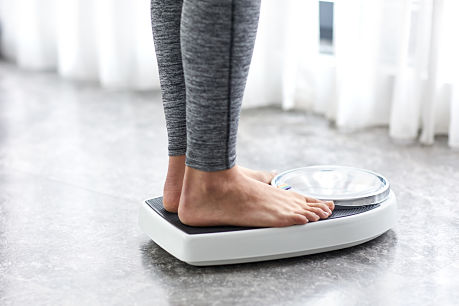What you need to know about the ketogenic diet
,
This low-carb diet isn’t for bread lovers
By now, nearly everyone has heard of the latest diet craze: the ketogenic diet, or “keto.” The keto diet is a favorite of celebrities for its waistline-slimming results and anti-sugar message.
The diet is meant to help shed extra pounds and keep blood sugar in check by promoting the creation of an acid in the blood called ketones.
“Carbohydrates—like those found in bread or grains—are made up of sugars that our bodies use for energy. When our bodies don’t have enough sugar to trigger the creation of insulin, we enter what is called ketosis,” says Allison Naylor, Geisinger registered dietitian. “In that metabolic state, our liver produces ketones to break down fat as a substitute energy source.”
Here’s what you need to know about the ketogenic diet.
“People on the keto diet have to avoid sugary foods like soda or candy, starchy foods like rice or pasta, all fruits and beans, most root vegetables and many condiments,” says Naylor. “They also have to avoid any artificial sweetener that uses sugar alcohols, as well as alcoholic beverages, like beer, which contain carbs.”
Red meats, fish, eggs, butter, cheese, heavy cream, oils, nuts and other low-carb veggies are ideal for the keto diet. Advocates of the diet recommend whole, single-ingredient foods to prevent any added-sugar or -carbs from slipping through the cracks.
The short answer is yes: The keto diet does work and can have health benefits even for those not seeking weight loss. However, it’s important to speak to your doctor or dietitian before adopting the lifestyle.
“The keto diet and ketosis can lead to weight loss, but it is extremely restrictive,” adds Naylor. “Unfortunately, most restrictive diets only offer short-term success. Most people gain the weight back because they can’t stick with the program.”
Aside from weight management, the keto diet has been proven effective in the treatment of chronic conditions like epilepsy, especially in children. In fact, this is how the diet originated.
“Research suggests that the production of ketones may influence neurotransmitter activity in neurons allowing for a reduction in seizure attacks. And it has been an option in drug-resistant cases for nearly a century,” explains Naylor.
There are also preliminary studies that claim the keto diet could be effective for the treatment of type 2 diabetes.
It’s best to discuss all major dietary and lifestyle changes with your doctor before you start. Extremely low-carb diets can lead to nausea, headache, digestive issues and fatigue.
The diet also makes it difficult to get your recommended number of nutrients. In addition, eating more servings of saturated fat can have a negative impact on long-term heart health.
“It’s not a well-balanced diet and many people find it difficult to follow and tolerate,” adds Naylor.
Another concern with this diet is the maintenance and potential loss of muscle mass.
“Eating carbohydrates helps us produce insulin, which promotes muscle growth. When we skip the carbs all together, muscle glycogen stores get depleted and we lose out on those muscle-building opportunities.”
Not enough research has been done on the ketogenic diet to be certain of its long-term impact on the body. Instead, experts suggest that subtle lifestyle changes and improvements in your habits will lead to a longer, healthier relationship with food.
Tired of fad diets? If you need help losing weight or maintaining your weight long-term, Geisinger’s weight-loss support team is here to help. Our weight-loss specialists work together with you to create a plan that is tailored to you and supports you every step of the way throughout your weight-loss journey.
The diet is meant to help shed extra pounds and keep blood sugar in check by promoting the creation of an acid in the blood called ketones.
“Carbohydrates—like those found in bread or grains—are made up of sugars that our bodies use for energy. When our bodies don’t have enough sugar to trigger the creation of insulin, we enter what is called ketosis,” says Allison Naylor, Geisinger registered dietitian. “In that metabolic state, our liver produces ketones to break down fat as a substitute energy source.”
Here’s what you need to know about the ketogenic diet.
What is the keto diet?
The ketogenic diet is similar to the Atkins diet; both are focused on nutrition plans with an extremely low carbohydrate intake. However, with keto, all carbs are ideally replaced with fats. In fact, the standard ketogenic diet involves 75 percent fat, 20 percent protein and only 5 percent carbs.“People on the keto diet have to avoid sugary foods like soda or candy, starchy foods like rice or pasta, all fruits and beans, most root vegetables and many condiments,” says Naylor. “They also have to avoid any artificial sweetener that uses sugar alcohols, as well as alcoholic beverages, like beer, which contain carbs.”
Red meats, fish, eggs, butter, cheese, heavy cream, oils, nuts and other low-carb veggies are ideal for the keto diet. Advocates of the diet recommend whole, single-ingredient foods to prevent any added-sugar or -carbs from slipping through the cracks.
Does the keto diet work?
The short answer is yes: The keto diet does work and can have health benefits even for those not seeking weight loss. However, it’s important to speak to your doctor or dietitian before adopting the lifestyle. “The keto diet and ketosis can lead to weight loss, but it is extremely restrictive,” adds Naylor. “Unfortunately, most restrictive diets only offer short-term success. Most people gain the weight back because they can’t stick with the program.”
The keto diet, outside of weight loss
Aside from weight management, the keto diet has been proven effective in the treatment of chronic conditions like epilepsy, especially in children. In fact, this is how the diet originated.“Research suggests that the production of ketones may influence neurotransmitter activity in neurons allowing for a reduction in seizure attacks. And it has been an option in drug-resistant cases for nearly a century,” explains Naylor.
There are also preliminary studies that claim the keto diet could be effective for the treatment of type 2 diabetes.
Is the keto diet safe?
It’s best to discuss all major dietary and lifestyle changes with your doctor before you start. Extremely low-carb diets can lead to nausea, headache, digestive issues and fatigue. The diet also makes it difficult to get your recommended number of nutrients. In addition, eating more servings of saturated fat can have a negative impact on long-term heart health.
“It’s not a well-balanced diet and many people find it difficult to follow and tolerate,” adds Naylor.
Another concern with this diet is the maintenance and potential loss of muscle mass.
“Eating carbohydrates helps us produce insulin, which promotes muscle growth. When we skip the carbs all together, muscle glycogen stores get depleted and we lose out on those muscle-building opportunities.”
Not enough research has been done on the ketogenic diet to be certain of its long-term impact on the body. Instead, experts suggest that subtle lifestyle changes and improvements in your habits will lead to a longer, healthier relationship with food.
Get help on your weight-loss journey
Tired of fad diets? If you need help losing weight or maintaining your weight long-term, Geisinger’s weight-loss support team is here to help. Our weight-loss specialists work together with you to create a plan that is tailored to you and supports you every step of the way throughout your weight-loss journey.
Start by learning your BMI with our free BMI calculator or make an appointment today.


Content from General Links with modal content



